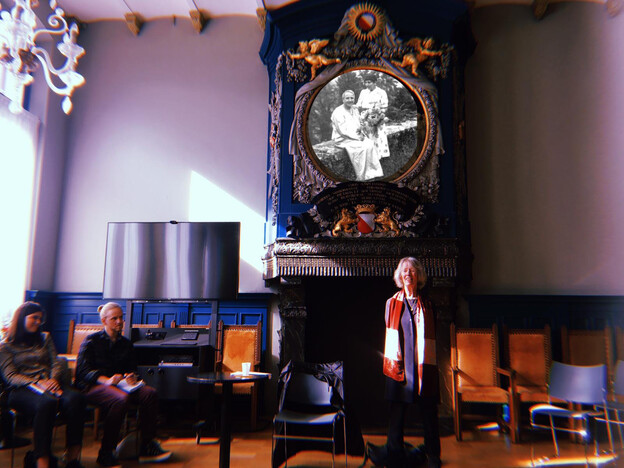The ‘Hejinian Method’

The best pedagogy course I’ve ever taken was having Lyn Hejinian as my teacher. Whenever I say this to other students of Lyn, such as Margaret, Julie and Jen, they always say, “Yes! Same!” It’s a corny joke, but Lyn didn’t mind corny jokes that much, so I will say that now in the classroom, I regularly think to myself, “What Would Lyn Do?” It is always the right way to decide, because in any case, it makes me feel like Lyn is there with me, we’re in the classroom together again, and, in this way, my students get to spend time with Lyn too. That feels like the best gift I can offer them.
Lyn would never have called what she did so remarkably as a teacher part of her “pedagogical method,” but rather as “writing collectively,” “taking time for poetry,” and “hanging out.” Lyn loved to hang out, and of course she was an incredible person to hang out with. I always knew Lyn was busy (superhumanly busy), but it never felt to me that she was on the clock around her students. In fact, she only had a half-time contract at UC Berkeley, so she was only supposed to teach one semester per year. She often taught year-round anyway, especially if there were other colleagues and students involved she wanted just to hang out with, and regularly organized extracurricular reading and writing groups, either in the department lounge or in her own home. Of course she had taught in various places before Berkeley, but she didn’t get her tenured job until she was 60. She loved teaching at Berkeley. Before that, she told me, her primary job was as an assistant to a private detective. But I guess she loved that too.
Lyn loved to chat. She asked you about your family, your hobbies, what you were watching on TV. She told you about how she was currently bingeing Mad Men and recalling how her childhood was spent surrounded by smoke, people really smoked that much back then, can you believe it? She also loved hearing gossip, even about people she barely knew (as long as it was funny and not malicious). I once told her about how my friend, a grad student in the Rhetoric program, Damon Young, was taking Double Dutch classes, and she loved that and wanted to know everything about it. She didn’t know Damon yet then, although later they would become colleagues and friends too.
Lyn delighted in knowing her students on an everyday, “how do you navigate this world,” kind of level, because those specific details, those small decisions, were the matter and material of poetics for her. As Lyn’s husband Larry wrote to me recently, “She loved her life.” Lyn wasn’t afraid of love: love as subject matter for her writing, love composing the shape of her thinking, loving all the miscellaneous and often overlooked details about the lives around her. She wasn’t afraid of how she loved her students and how her students loved her back. After all, we were humans before we were poets or poetry scholars, and Lyn was tirelessly, radiantly, radically humane. Love, as pedagogy, was this reciprocation.
I wrote earlier that I regularly ask myself, “What Would Lyn Do?” and perhaps the most frequent answer to that is, “Don’t be afraid of love.” Why do I write, teach, and study poetry? In the end, the only real answer can be that I love it. And, “Don’t be afraid to delight in your work, and if it doesn’t delight you, find a way to make it.” Thanks to Lyn, no one can convince me that suffering is an inherent or noble part of this job. And, “Don’t be afraid of showing those strange, specific, small things about you, because you will still find people who will delight in and love you.” What a gift, one of the best gifts of my life, to have found Lyn Hejinian.
In 2019, Lyn actually came to Utrecht to scope out the classrooms where I had started teaching, to meet some of the students who hopefully had caught glimpses of her through my channeling. She gave a lecture on “The Aesthetics of Activism” in a fancy room in Utrecht University’s Academiegebouw, where we smuggled in bottles of wine and plastic cups we bought from the nearby supermarket. The next day we went to Amsterdam for a Gertrude Stein symposium at Perdu, a poetry bookstore and theater venue, where Lyn gave the keynote lecture (on Lucy Church Amiably) and did a hilariously charming bilingual reading of “Ladies’ Voices” with the poet Anneke Brassinga, who had translated Stein’s work into Dutch. Later that night, Lyn did a reading of her own long poem “Resistance” at the bookstore San Seriffe, which was so full Lyn had to stand on a ladder, and many people spilled out into the street. She ended her reading by yelling, “Fuck fascists!”
Lyn, tireless as always, was game for another drink once we got back to Utrecht, so I took her to a tiny, all-wood bar decorated with holiday lights called Jan de Winter. We stayed until closing, 2am. After Lyn returned to the U.S., she wrote to me that she had started dreaming of moving to Utrecht and becoming the owner/purveyor of Jan de Winter. She thought that would be an excellent retirement plan, although her family was in the U.S., so it was probably unlikely to happen. (This latter part made me think she was actually semi-serious.) In the end, she taught me, isn’t that really the best part of our jobs, isn’t that what she would do, what I should do: that we get to enjoy sitting in some strange, specific, small bar with delightful company and chat about poetry, that thing we’re unafraid to love?
Edited byMargaret Ronda Jennifer Scappettone Mia You Julie Carr